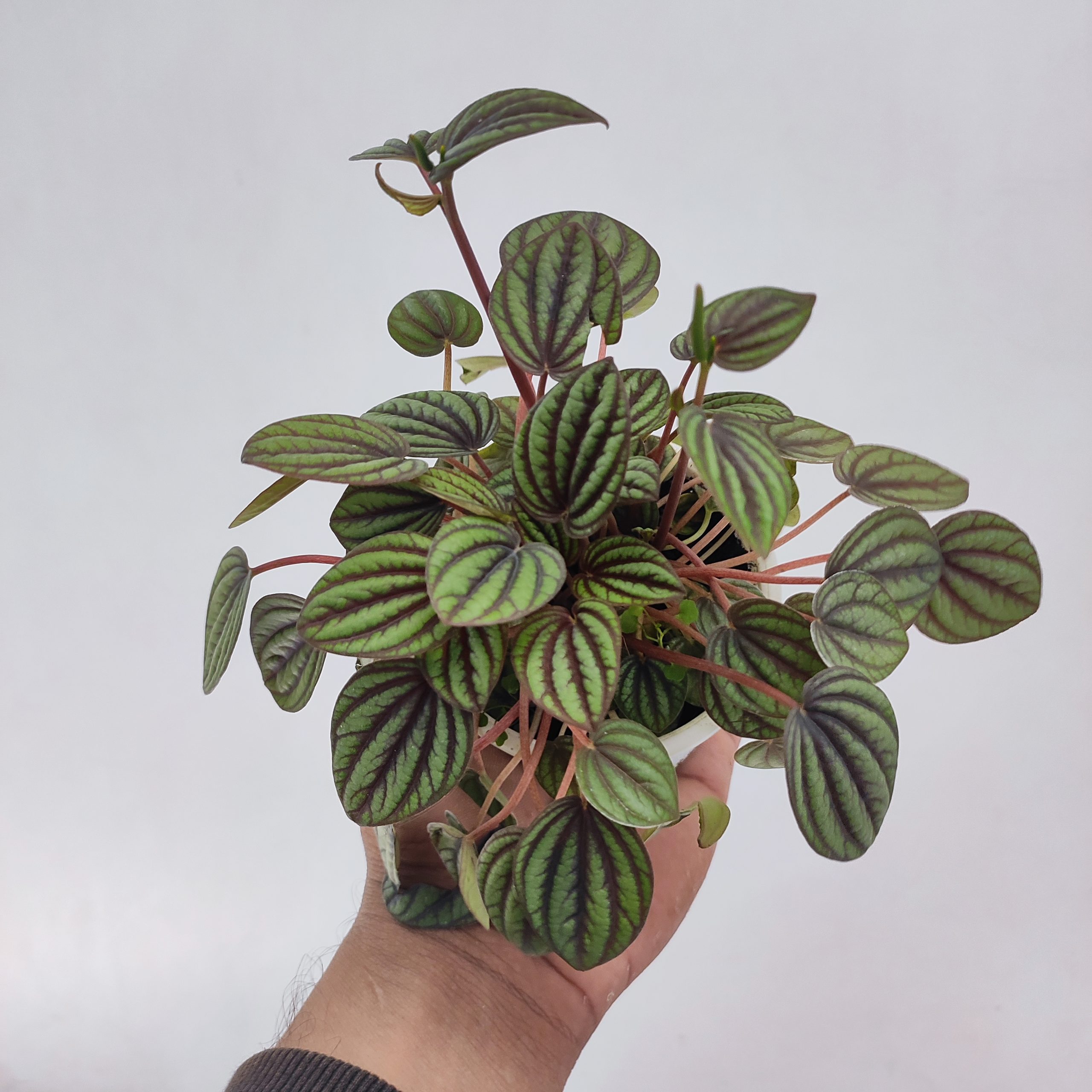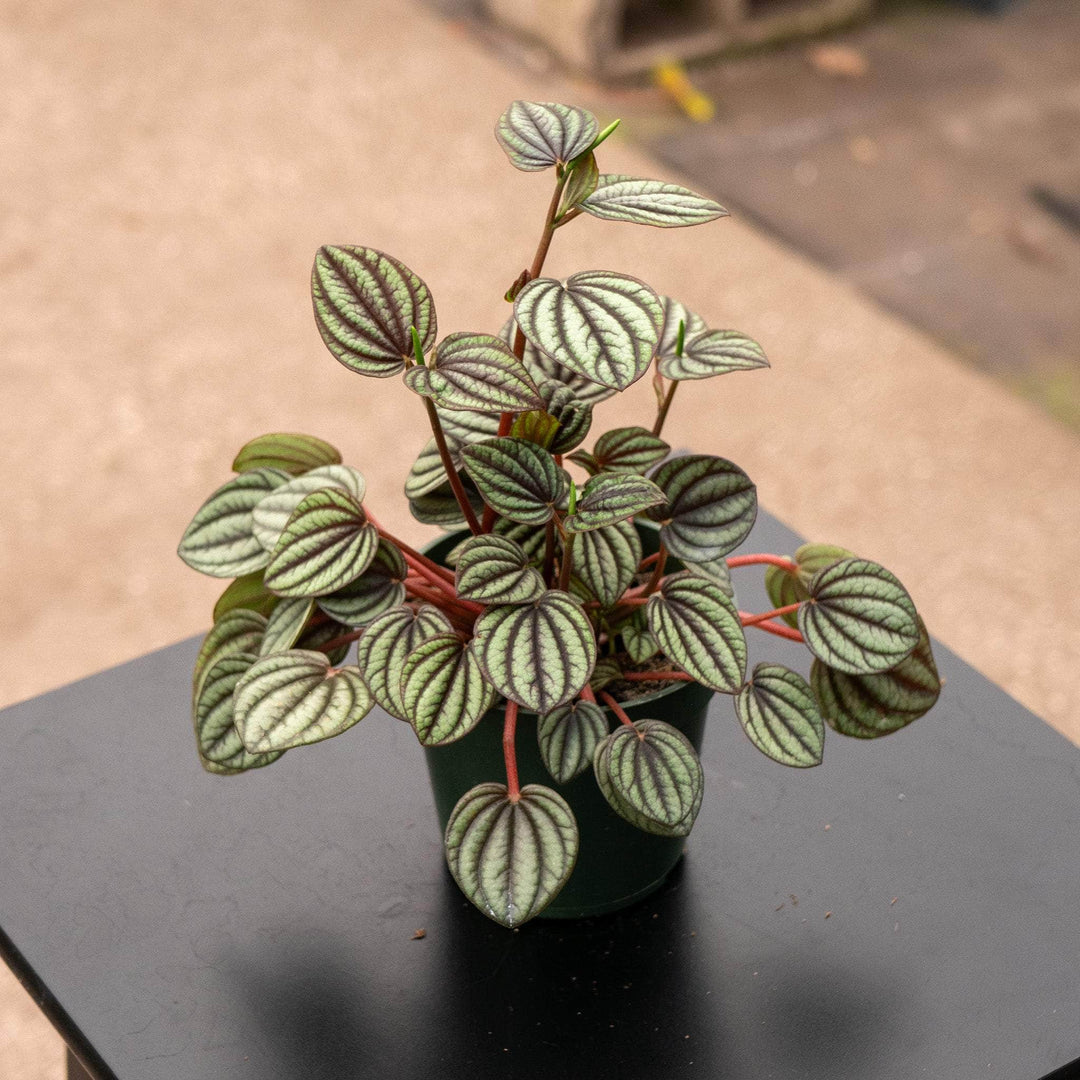Peperomia Albovittata Piccolo Banda is a compact, attractive houseplant with striking silver and green leaves. It’s perfect for small spaces and easy to care for.
Peperomia Albovittata Piccolo Banda is a popular choice among indoor plant enthusiasts. Its unique foliage features intricate patterns of silver and green, making it a visually appealing addition to any home. This plant thrives in low to medium light conditions, making it versatile for various indoor environments.
It requires minimal watering and is relatively low-maintenance, which is ideal for busy individuals or novice gardeners. With its compact size, Peperomia Albovittata Piccolo Banda fits perfectly on desks, shelves, and windowsills. Its aesthetic appeal and easy care make it a favorite among plant lovers.

Credit: nurserybuy.com
Ideal Environment
The Peperomia Albovittata Piccolo Banda thrives in specific conditions. Creating the ideal environment ensures your plant stays healthy and vibrant. Follow these guidelines to provide the best home for your Piccolo Banda.
Light Requirements
Peperomia Albovittata Piccolo Banda prefers bright, indirect light. Direct sunlight can scorch its leaves. Place your plant near a north or east-facing window. If natural light is scarce, use fluorescent lights.
Temperature And Humidity
This plant enjoys warm temperatures. Ideal temperature ranges from 65°F to 75°F (18°C to 24°C). Avoid placing it near drafts or air conditioners.
Peperomia Albovittata Piccolo Banda loves high humidity. Aim for humidity levels around 40% to 50%. Use a humidifier or place a tray of water near the plant.
Here’s a quick guide for reference:
| Condition | Ideal Range |
|---|---|
| Temperature | 65°F to 75°F (18°C to 24°C) |
| Humidity | 40% to 50% |
By providing the right light, temperature, and humidity, your Peperomia Albovittata Piccolo Banda will flourish beautifully.

Credit: www.gabriellaplants.com
Soil And Potting
Peperomia Albovittata Piccolo Banda thrives with the right soil and pot. Proper soil mix and pot choice ensure healthy growth. Let’s explore the best practices.
Best Soil Mix
The best soil mix for Peperomia Albovittata Piccolo Banda is well-draining. This plant prefers a mix that mimics its natural habitat. Use a combination of:
- Cactus potting mix
- Orchid bark
- Perlite
This combination provides aeration and drainage. Avoid heavy soils that retain water. Too much moisture can lead to root rot. A light and airy mix is essential for healthy roots.
Choosing The Right Pot
The right pot is crucial for Peperomia Albovittata Piccolo Banda. Choose a pot with drainage holes. These holes prevent water from sitting at the bottom.
Consider these factors when choosing a pot:
| Factor | Importance |
|---|---|
| Size | The pot should be slightly larger than the root ball. |
| Material | Terracotta pots are ideal as they allow the soil to dry out. |
| Drainage | Pots with multiple holes ensure proper water drainage. |
A well-chosen pot promotes healthy growth. It also prevents root diseases. Ensure the pot fits the plant and its needs.
Watering Needs
The Peperomia Albovittata Piccolo Banda is a unique houseplant with specific watering needs. Proper watering ensures your plant thrives and stays healthy. Below, we will dive into the details of how to water this beautiful plant.
Frequency And Amount
Water your Peperomia Albovittata Piccolo Banda every 1-2 weeks. The frequency depends on the season and indoor humidity. During warmer months, you might need to water more often. In the winter, reduce the watering frequency.
Always check the soil before watering. Stick your finger about an inch deep into the soil. If the soil feels dry, it’s time to water. If it still feels moist, wait a few more days.
| Season | Watering Frequency |
|---|---|
| Spring/Summer | Once a week |
| Fall/Winter | Every two weeks |
Signs Of Overwatering
Overwatering can harm your Peperomia Albovittata Piccolo Banda. Look out for these signs:
- Yellowing leaves
- Wilted appearance
- Root rot
Yellowing leaves are the first sign. If you notice this, check the soil moisture. Wilted appearance might also indicate too much water. Root rot is a severe condition caused by standing water.
To prevent overwatering, use well-draining soil. Ensure your pot has drainage holes. This helps excess water escape, keeping roots healthy.
Fertilizing Tips
Fertilizing your Peperomia Albovittata Piccolo Banda is essential for its healthy growth. This plant has specific needs when it comes to nutrients. Proper fertilization ensures vibrant leaves and robust growth. Let’s delve into the best fertilizers and application schedule for this unique plant.
Best Fertilizers
Choosing the right fertilizer is crucial. Here are some top options:
- Balanced Liquid Fertilizer: Provides equal parts nitrogen, phosphorus, and potassium.
- Slow-Release Granules: Gradually release nutrients over time.
- Organic Fertilizer: Ensures gentle feeding with natural ingredients.
Each type offers unique benefits. Balanced liquid fertilizers work quickly. Slow-release granules provide steady nourishment. Organic fertilizers are eco-friendly and gentle on the plant.
Application Schedule
Applying fertilizer at the right time is key. Follow this simple schedule:
| Season | Frequency |
|---|---|
| Spring | Every 4 weeks |
| Summer | Every 4 weeks |
| Fall | Every 6 weeks |
| Winter | Avoid fertilizing |
During spring and summer, fertilize every four weeks. In fall, reduce to every six weeks. Avoid fertilizing in winter as the plant rests.
Always follow the instructions on the fertilizer package. Over-fertilizing can harm the plant. Less is often more with Peperomia Albovittata Piccolo Banda.
Pruning And Maintenance
Peperomia Albovittata Piccolo Banda is a delightful houseplant. Proper pruning and maintenance keep it healthy and attractive. This section will guide you on pruning and maintaining your plant.
When To Prune
Prune your Peperomia Albovittata Piccolo Banda during its growing season. The best time is spring or early summer. Look for signs like leggy growth or dead leaves. Pruning helps the plant stay bushy and promotes new growth.
Tools And Techniques
Use clean, sharp tools for pruning. Here are some essential tools:
- Pruning Shears: For cutting thicker stems.
- Scissors: For trimming smaller leaves.
- Disinfectant: To clean the tools before and after use.
Follow these steps to prune your Peperomia Albovittata Piccolo Banda:
- Inspect the plant for dead or yellowing leaves.
- Cut these leaves close to the stem.
- Trim leggy stems just above a leaf node.
- Remove any flowers to redirect energy to the foliage.
- Dispose of the cuttings properly.
Use a gentle hand while pruning. Avoid cutting too much at once. Regular maintenance ensures a lush and healthy plant.
Common Problems
The Peperomia Albovittata Piccolo Banda is a resilient plant. But, it can face some common problems. Knowing these issues helps keep your plant healthy.
Pest Control
Pests can harm your Peperomia Albovittata Piccolo Banda. The most common pests are:
- Spider Mites: Tiny red or black bugs. They create web-like structures.
- Mealybugs: Small white bugs. They leave a cotton-like residue.
- Aphids: Small green insects. They gather on new growth.
To control pests, use these methods:
- Neem Oil: Spray the plant with neem oil solution.
- Insecticidal Soap: Apply insecticidal soap to affected areas.
- Manual Removal: Wipe leaves with a damp cloth.
Disease Management
Disease can affect your Peperomia Albovittata Piccolo Banda. Common diseases include:
| Disease | Symptoms | Solution |
|---|---|---|
| Root Rot | Brown, mushy roots. Yellowing leaves. | Reduce watering. Ensure good drainage. |
| Leaf Spot | Brown or black spots on leaves. | Remove affected leaves. Improve air circulation. |
| Powdery Mildew | White powdery substance on leaves. | Use a fungicide. Increase light and air flow. |
Keep your plant in a healthy environment. Regularly check for signs of disease.
Propagation Methods
Propagating Peperomia Albovittata Piccolo Banda is easy and fun. You can use two main methods: stem cuttings and leaf cuttings. Both methods are simple and effective. Let’s dive into the details!
Stem Cuttings
Stem cuttings are a popular way to propagate Peperomia Albovittata Piccolo Banda. Follow these steps:
- Choose a healthy stem with at least two leaves.
- Use a clean, sharp knife or scissors.
- Cut the stem just below a leaf node.
- Remove the lower leaves, leaving the top two.
- Place the cutting in water or soil.
- Keep it in a warm, bright spot.
- Wait for roots to develop, usually in a few weeks.
Here is a table summarizing the steps:
| Step | Action |
|---|---|
| 1 | Choose a healthy stem with two leaves. |
| 2 | Use clean, sharp tools. |
| 3 | Cut below a leaf node. |
| 4 | Remove lower leaves. |
| 5 | Place in water or soil. |
| 6 | Keep in a bright, warm spot. |
| 7 | Wait for roots to grow. |
Leaf Cuttings
Leaf cuttings are another easy method to propagate this plant. Follow these steps:
- Select a healthy leaf from the plant.
- Cut the leaf with a clean, sharp knife.
- Let the cut surface dry for a few hours.
- Place the leaf in soil, cut side down.
- Keep the soil moist but not waterlogged.
- Place the pot in a warm, bright area.
- Watch for new growth in a few weeks.
Using these methods, you can easily propagate Peperomia Albovittata Piccolo Banda. Enjoy growing your plant collection!

Credit: foliacollective.com
Frequently Asked Questions
What Is Peperomia Albovittata?
Peperomia Albovittata is a popular houseplant known for its striking foliage. The leaves are dark green with silver veins.
How Do You Care For Peperomia Piccolo Banda?
Peperomia Piccolo Banda requires bright, indirect light and moderate watering. Allow the soil to dry out between waterings.
Is Peperomia Albovittata Toxic To Pets?
No, Peperomia Albovittata is non-toxic to pets. It is safe for both cats and dogs.
How Often Should I Water Peperomia Albovittata?
Water Peperomia Albovittata when the top inch of soil is dry. Overwatering can lead to root rot.
Conclusion
Peperomia Albovittata Piccolo Banda is a stunning addition to any indoor garden. Its unique foliage and easy care make it perfect for beginners. Enjoy the beauty and low-maintenance nature of this plant. Add Peperomia Albovittata Piccolo Banda to your collection today and elevate your indoor greenery game.
